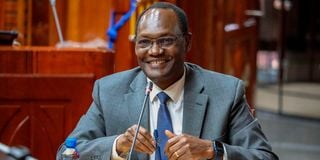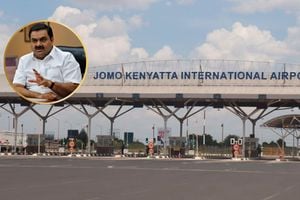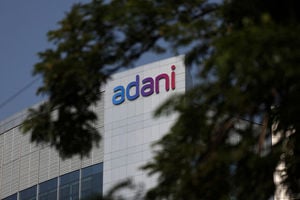
Treasury Principal Secretary Chris Kiptoo.
The government will seek a new investor to expand Jomo Kenyatta International Airport (JKIA) following the cancellation of the controversial Adani deal, Treasury Principal Secretary Chris Kiptoo has said.
He told the National Assembly's Public Accounts Committee that the expansion and modernisation of JKIA will have to be done through a public-private partnership.
He told lawmakers that the JKIA expansion will require $2 billion (about Sh260 billion), which cannot be funded from the national budget.
“I have to be honest here. We have a very tight fiscal space at the moment. JKIA requires $2 billion and the expansion plan has lagged by more than 10 years,” Dr Kiptoo said.
“This is a strategic hub and it is important that we modernise it but we have no money in the budget... We need to ask ourselves that apart from Adani, who else can do this JKIA expansion?”
Dr Kiptoo said the new JKIA public private partnership would be competitive as the airport is a strategic hub in the region.
He said when JKIA was designed in 1978, it was meant to handle seven million passengers but the airport currently handles nine million passengers and cargo.
President William Ruto on November 21 ordered the Ministry of Transport to cancel the proposed JKIA deal with Indian conglomerate Adani Group.
The government had been considering the Privately Initiated Proposal (PIP) by the Adani Group, founded by Indian billionaire Gautam Adani, to lease the country's main airport for 30 years in exchange for expansion.
The public-private partnership (PPP) project sparked public outrage, with the Law Society of Kenya (LSK) and the Kenya Human Rights Commission challenging the deal in court, saying it was unaffordable, threatened job losses and did not offer value for money.
President Ruto also ordered the Energy ministry to cancel the Sh95.6 billion deal between state-owned utility Ketraco and Adani Energy Solutions to build and operate power infrastructure, including transmission lines.
The President gave the orders as he delivered his second State of the Nation Address in Parliament to defend his government's economic record.
“I have stated in the past, and I reiterate today, that in the face of undisputed evidence or credible information on corruption, I will not hesitate to take decisive action. Accordingly, I now direct -- in furtherance of the principles enshrined in Article 10 of the Constitution on transparency and accountability, and based on new information provided by our investigative agencies and partner nations -- that the procuring agencies within the Ministry of Transport and the Ministry of Energy and Petroleum immediately cancel the ongoing procurement process for the JKIA Expansion Public Private Partnership transaction, as well as the recently concluded Ketraco transmission line Public Private Partnership contract, and immediately commence the process of onboarding alternative partners,” President Ruto told Parliament in his State of the Nation address last Thursday.
Dr Kiptoo told the committee that major projects such as the JKIA expansion require substantial resources that can only be delivered through a public-private partnership model.
He told the committee's chairperson, Funyula MP Ojiambo Oundo, that the Treasury was restructuring the public-private partnership department to build its capacity to handle complex projects.
“We have also trained ministries, departments and agencies (MDAs) and county governments on how to be involved in public-private partnership structuring,” Dr Kiptoo said while responding to audit queries raised by the Auditor-General on the National Treasury’s books of accounts for the year to June 2022.
“The processes on how to structure public-private partnership projects have been greatly improved. We want to cut bureaucracy, ensure transparency and accountability, and conduct detailed feasibility and due diligence before we can enter into any public-private partnerships.”
Dr Oundo said the mention of the word such partnerships raises eyebrows as Kenyans are now scared of scandals such as the Adani JKIA and Ketraco debacles.
“We appreciate public-private partnerships but what we want as a committee is transparency, accountability and the best interest of the Kenyan people,” said Dr Oundo, who chaired the meeting.
“Let the Treasury or any other government entity do the public-private partnerships transparently and as per the laid down laws. We want Kenyans to be involved in the process to create ownership of the projects.”
Bura MP Yakub Adow said the committee was not opposed to the JKIA expansion through the public-private partnership model, but the Treasury must ensure competitive bidding, detailed feasibility studies and due diligence.
“We want Kenyans to be involved when PPPs are being developed to avert a backlash and unpopular projects,” Mr Adow said.
In the agreement with Ketraco, Adani proposed to build a new 206km Thika-Malaa-Konza line, a 95km Rongai-Keringet-Chemosit link and about 98km for the Menengai-Ol-Kalou-Rumuruti line. In addition, two substations were to be constructed – the 132kV Thurdiburo substation and the 400/220/132kV Rongai substation.
The JKIA and Ketraco projects were frozen by the High Court pending the determination of the cases.
The deals were cancelled after Gautam Adani, the billionaire chairperson of Indian conglomerate Adani Group and one of the world's richest people, was indicted in New York for his role in an alleged multi-billion dollar bribery and fraud scheme.
US prosecutors said Adani and seven other defendants, including his nephew Sagar Adani, agreed to pay about $265 million in bribes to Indian government officials to win contracts expected to generate $2 billion in profits over 20 years and develop India's largest solar power project.











